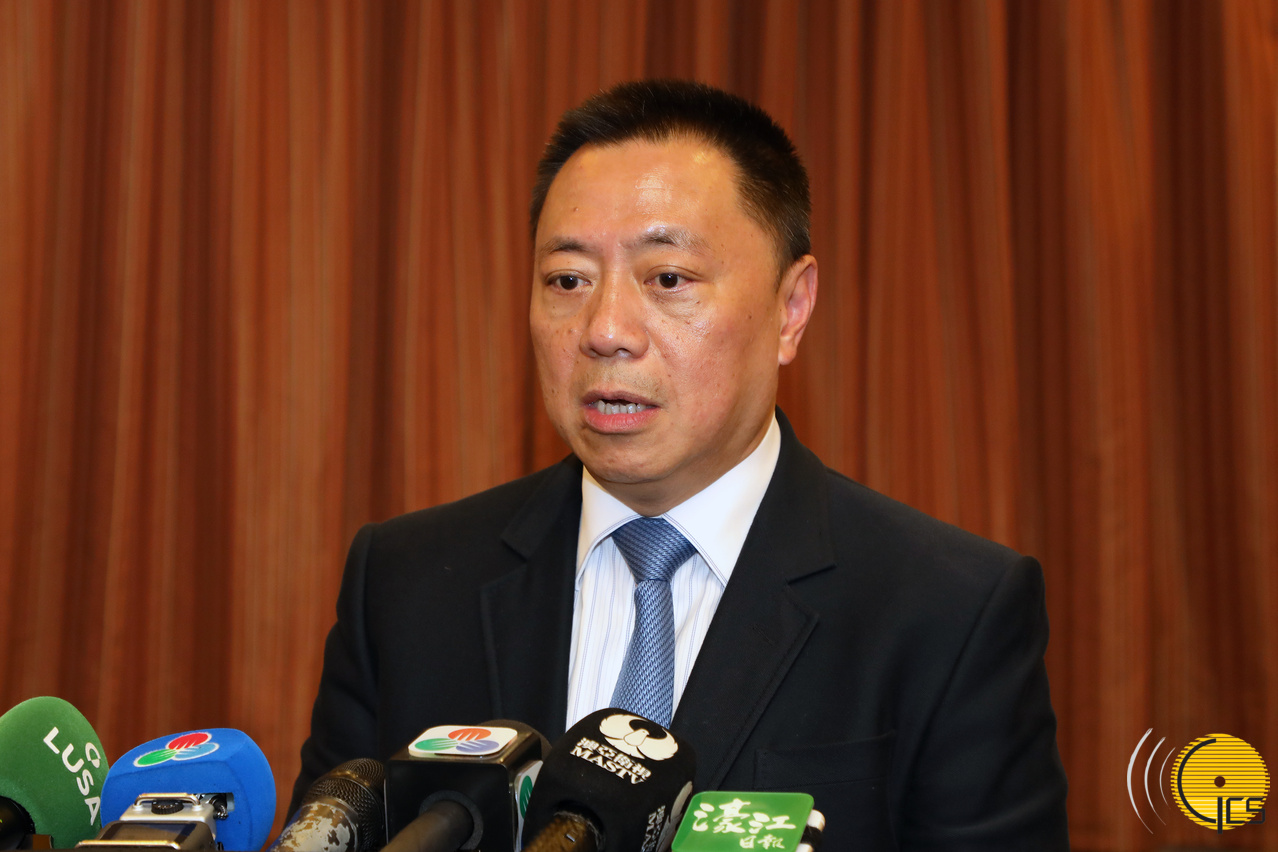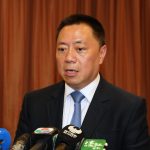 The Secretary for Economy and Finance, Mr Leong Vai Tac, speaks to reporters.
The Secretary for Economy and Finance, Mr Leong Vai Tac, speaks to reporters.
The Secretary for Economy and Finance, Mr Leong Vai Tac, said on Thursday (30 May) that the Government would continue paying close attention to the impact of changes wrought on Macao’s economy by the fluctuating global economic situation and related uncertainties, ensuring the city would be well prepared for any challenges that might arise.
As the value of mainland China goods re-exported to the United States via Macao represented a relatively low proportion of Macao’s Gross Domestic Product (GDP), the direct impacts of the Sino-U.S. trade frictions on Macao’s GDP would not be significant, he said.
Mr Leong made the comments when speaking to the media immediately after a public event on Thursday afternoon. He said the Government had established a system to address local economic repercurssions as they might relate to wider economic uncertainties. The Monetary Authority of Macao was closely monitoring the investments of the Macao SAR’s fiscal reserves. The Government was well prepared, had good planning and was making appropriate adjustments from time to time, to safeguard against these investments being adversely affected by volatility in market conditions.
The Economic Bureau also continued to monitor matters regarding any changes affecting re-export of goods to the United States from mainland China via Macao. In fact, as the value of goods re-exported to the United States via Macao represented a relatively low proportion of Macao’s GDP, the direct impacts of the Sino-U.S. trade frictions on Macao’s GDP would not be significant.
Mr Leong noted however that increased economic volatility might affect domestic consumption, and consumer sentiment among tourists visiting Macao; and that any negative changes to currency exchange rates would also reduce tourists’ appetite for consumption. These factors might indirectly affect Macao’s export of services, and tourism-related consumption, things which would be especially closely monitored by the Macao SAR Government.
According to the Secretary, recent observations were that the latest news about Sino-U.S. trade frictions caused less fluctuation in stock markets than did earlier reports. It is believed that investors had already anticipated the ongoing economic changes, and hedging measures were being implemented. He stressed that despite the trade frictions, there was still widespread confidence regarding the long-term economic development of the nation as a whole and that of Macao.
Mr Leong said Macao was about to announce its first-quarter 2019 economic statistics. Macao’s GDP would record a negative growth year-on-year, mainly due to the high base figures in the first quarter of 2018. For example, the construction of the Macao border crossing area of the Hong Kong-Zhuhai-Macao Bridge in first-quarter 2018 involved high public expenditure, and this year there had been significantly reduced investment in public projects.
Regarding private investments, a significant number of large-scale construction projects was completed in 2018. As the number of new-project starts had been decreasing, private investments in first-quarter 2019 had also seen a considerable downward adjustment, while export of services remained stable.
Mr Leong said he believed that Macao would maintain its overall economic competitiveness this year, but it would not be easy to achieve growth. The Government would adhere to the overall approach of making progress while ensuring stability.
Regarding the volume of renminbi clearing by Portuguese-speaking countries via Macao, Mr Leong said that such clearing in the past was mostly related to trade in goods rather than investment and financing. Macao was committed to developing specialised financial services, and enabling more financing projects relating to Portuguese-speaking countries to perform transactions in Macao. This would be beneficial to Macao’s development as a renminbi-clearing centre for Portuguese-speaking countries.
Mr Leong said that investment, financing and bond-issuance activities would play a greater role than trade in food and other goods in boosting the volume of renminbi-clearing activities.
He also said that after the Government had signed cooperation agreements with the Industrial and Commercial Bank of China and the Bank of China, several loan transactions related to Portuguese-speaking countries had been conducted in Macao, involving more than 10 billion U.S. dollars. He believed this trend would continue, as a greater number of conventions involving bankers and financiers were being held in Macao. Gradual completion of relevant infrastructure also served to enhance Macao’s functions as a platform for cooperation in financial services between China and Portuguese-speaking countries, and as a renminbi-clearing centre for Portuguese-speaking countries.
Responding to a media inquiry about the China-Portuguese-speaking Countries Cooperation and Development Fund, Mr Leong said the Government had injected 400 million U.S. dollars into the fund, while another investment of 600 million U.S. dollars had been injected by the China Development Bank.
Now that the fund was based in Macao, the Government had begun facilitating changes, such as requesting the fund to lower the threshold for applications, and encourage bilateral investment instead of focusing on investment projects of mainland Chinese or Macao enterprises in Portuguese-speaking countries. These changes would support the new stage of national development, by attracting more enterprises from Portuguese-speaking countries to explore the China market.
The Government continued to help the fund to meet its requirements, and to communicate with the major shareholder, the China Development Bank. The Government would also listen to opinions from within society, ensuring the fund could better perform its functions, he added.


